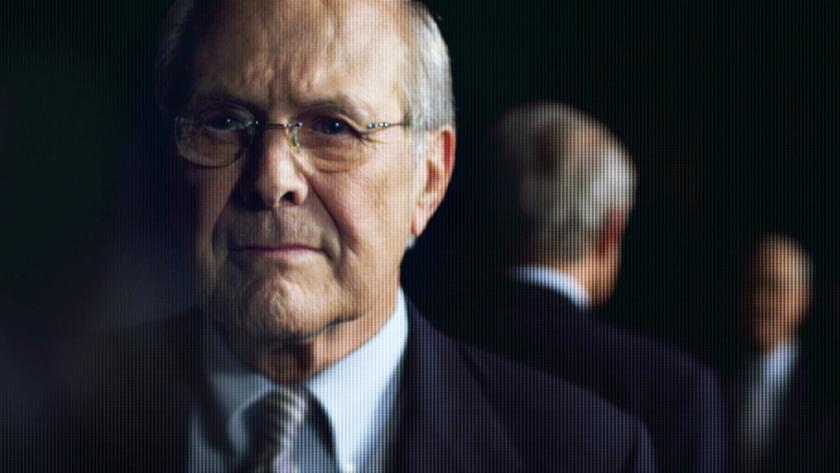If Errol Morris lived in Middle Earth he’d make a documentary about Sauron. If he taught at Hogwarts, he’d be turning his cameras on Voldemort. You get the idea. Morris is drawn to Dark Overlords, powerful men of steely ambition and ego, convinced of their own rightness even after events have proven that their wrong-headed ideas have demonstrably contributed to the sum of human misery.
He can also claim to be the only person to have made documentaries about not one but two former U.S. Defense Secretaries (Ministers), the pinnacle of the Pentagon. The first was 2003’s Oscar-winning The Fog of War, “Eleven Lessons from the Life of Robert S. McNamara”, the Defense Secretary during the JFK and Johnson administrations who presided over the escalation of America’s involvement in the Vietnam war. As the title suggests, McNamara reflects on what the experience taught him. A technocrat who was forced to question his core values, he became more humble and more human, with all the pain that implies.
Donald Rumsfeld, the Defense Secretary in the George W. Bush administrations who presided over the escalation of America’s involvement in Iraq and the subject of Morris’s latest film, The Unknown Known, is a very different kettle of fish; introspection, remorse and regret are concepts that need not detain him. One of the film’s main recurring images is a calm sea, a perfect metaphor for the Rumsfeld persona, where no turmoil shows on the unruffled surface.
 Instead of a conventional biography that incorporates contributions from associates of the great man, the film’s sole talking head is Rumsfeld, discussing a fraction of the numerous memos (an estimated 20,000 in just six years) he has dictated over time. These are a combination of to-do lists, managerial analysis (Rumsfeld is interested in whether a course of action is right only in terms of effectiveness, not morality) and Sun Tzu-ish aphorisms like “if you wish for peace, prepare for war”.
Instead of a conventional biography that incorporates contributions from associates of the great man, the film’s sole talking head is Rumsfeld, discussing a fraction of the numerous memos (an estimated 20,000 in just six years) he has dictated over time. These are a combination of to-do lists, managerial analysis (Rumsfeld is interested in whether a course of action is right only in terms of effectiveness, not morality) and Sun Tzu-ish aphorisms like “if you wish for peace, prepare for war”.
Though he explicitly rejects any suggestion of being Machiavellian, it becomes clear that Rumsfeld is primarily concerned with strategic advantage, both on the geo-political stage and in the snakepit of Republican party politics. Appointed the youngest-ever Secretary of Defense by Gerald Ford, he had a ringside seat for the evacuation of Saigon, which he describes as the “inevitable ugly ending of an unsuccessful effort”. As Reagan’s special envoy to the Middle East, he urged keeping US troops out of a peacekeeping force in the region because “it’s easier to get into things than to get out of them” (irony is another word that doesn’t appear in the Rumsfeld lexicon).
Try as he might, Morris (pictured above right) cannot pierce Rumsfeld’s gleaming carapace of genial self-assurance. While admitting that he found the images of torture at Abu Ghraib (the subject of another Morris doc) “disgusting”, even offering his resignation in their wake, Rumsfeld denies that such practices had their roots at Guantanamo, though an official report contradicts this. He also sees nothing wrong with Guantanamo itself (“as well-run as any prison on the face of the earth”), with using Saddam’s mythical WMDs as the rationale for war (“the absence of evidence is not the evidence of absence”) or with the post-invasion administration of Iraq (“here’s a country being liberated. Stuff happens.”)
Without what The X Factor might call an emotional journey, the film lacks a certain narrative momentum. Its subject is not an Unknown Known, described in a memo as something “you think you know that it turns out you did not”. On the contrary, with Rumsfeld what you see is what you get. There are no hidden depths to this untroubled sea.
Overleaf: watch the trailer for The Unknown Known















Add comment